AIDA Data Hub DSP Now Open for Business
2025-03-20
Wednesday March 19, 2025, was the date of the successful launch of the AIDA Data Hub Data Science Platform – DSP – as Sweden’s first data science platform tailored to the needs of research and clinical innovation in data driven precision health. The event was celebrated at the DSP Launch Conference by national and international researchers, innovators and leaders, from industry, academia, healthcare, and patient organizations.
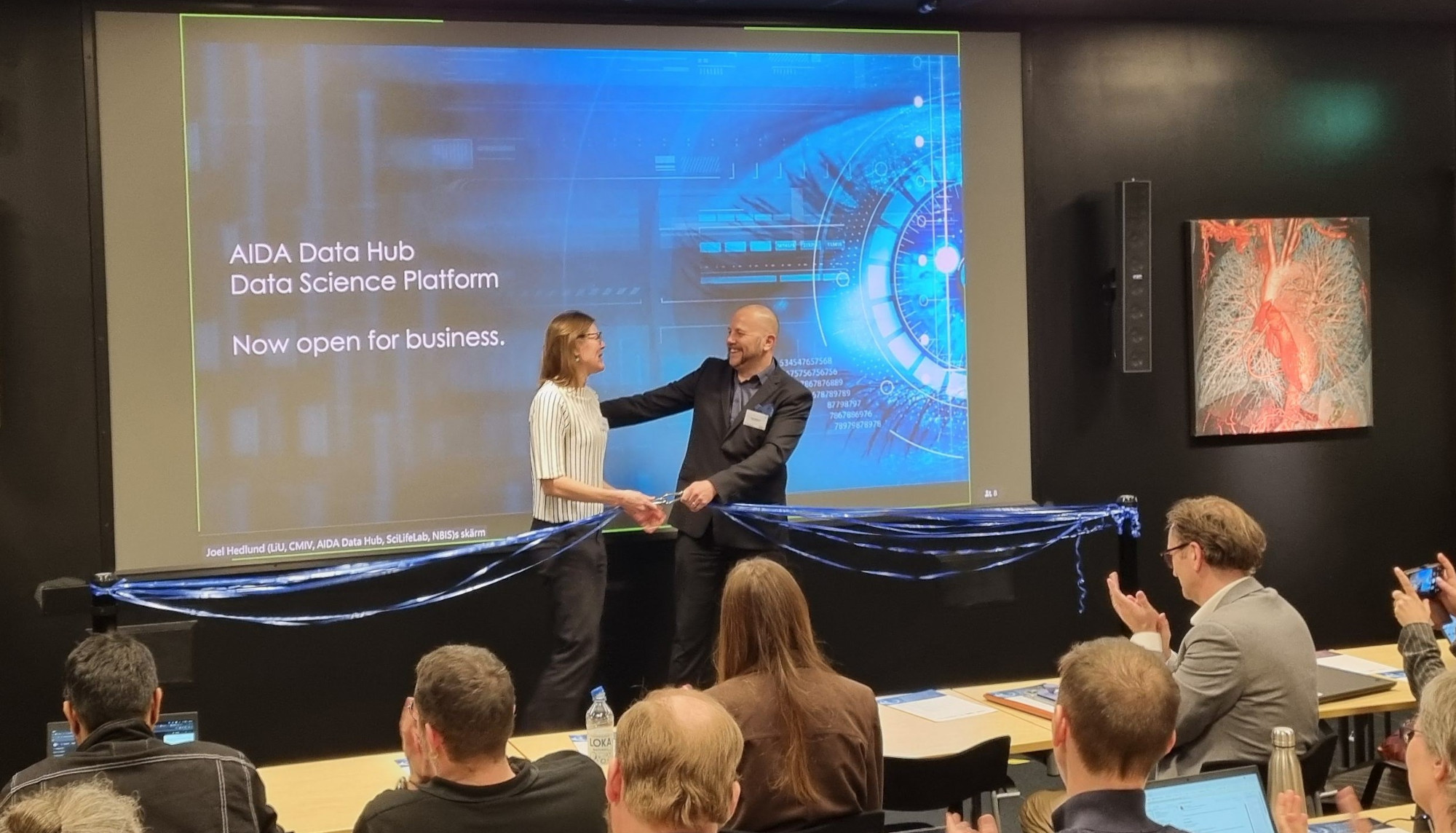 AIDA Steering group founding member Carolina Wählby and AIDA Data director Joel Hedlund inaugurate the DSP not by cutting a ribbon, but by making connections.
AIDA Steering group founding member Carolina Wählby and AIDA Data director Joel Hedlund inaugurate the DSP not by cutting a ribbon, but by making connections.
Medical research often requires handling large amounts of sensitive data, and often takes longer than an election cycle to complete. This means that medical researchers often find themselves needing to store sensitive data longer than their hardware investors can comfortably guarantee that their data can be kept. Also, clinical innovation is often highly dependent on excellent features for collaboration to even get off the launch pad.
Despite having generally very strong infrastructure support to research, Sweden has lagged behind its neighboring countries when it comes to support to medical research and clinical innovation.
“That changes today”, announces AIDA Data director Joel Hedlund. “With the launch of the DSP, we can start catching up.”
“The DSP is the first platform in Sweden that combines secure long term primary storage with AI compute, where the security measures are customizable to the needs in your research”, explains Joel. “The DSP offers a data collaboration platform where these features are combined.”
AIDA founder and Scientific Director Claes Lundström elaborates: “This unprecedented combination is what makes DSP suited to accelerate both medical research, industrial innovation, and clinical development, in turn leading to quality of care benefits for patients and economic gains for society.”
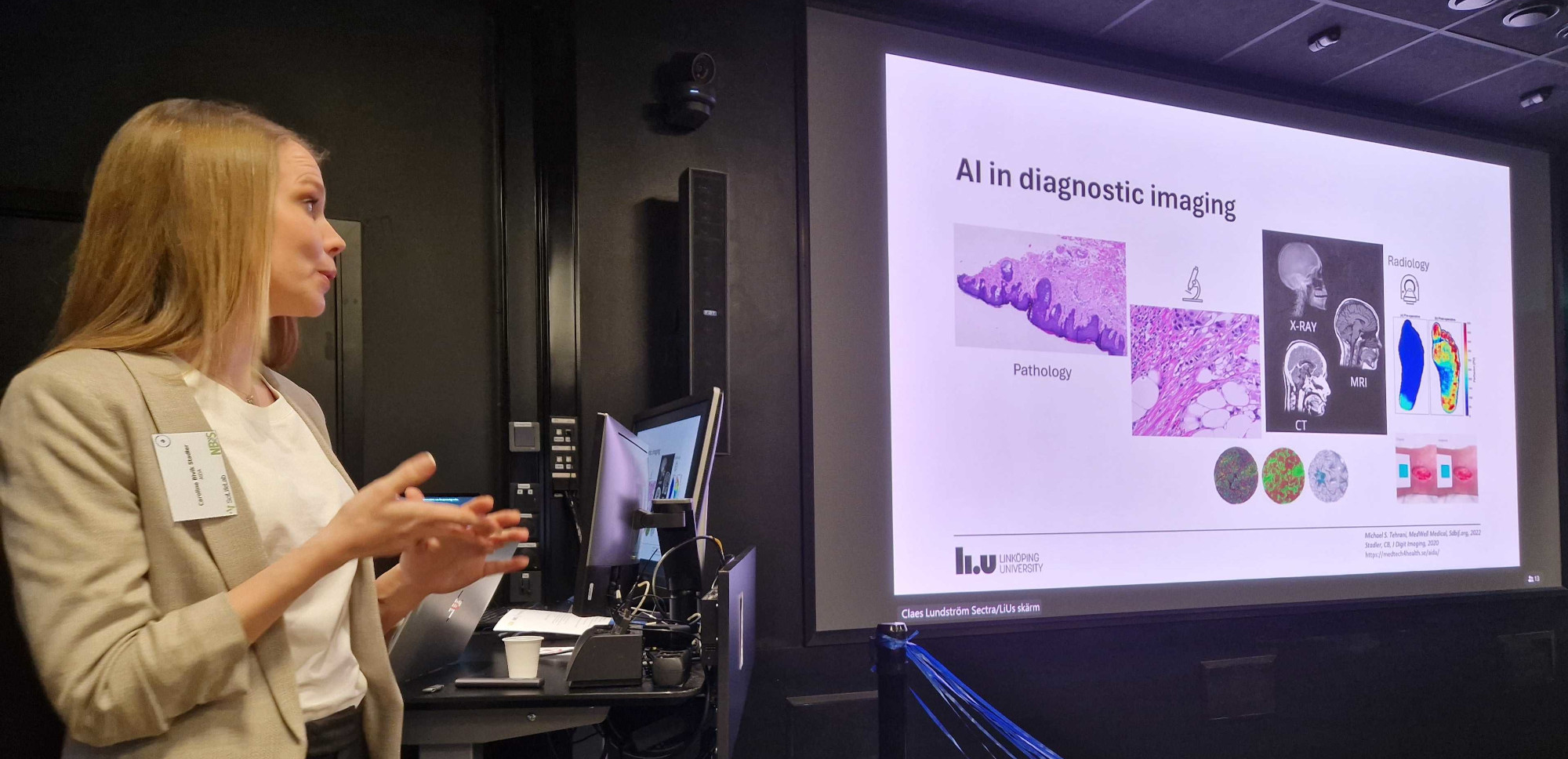 AIDA Arena director Caroline Bivik Stadler presenting collaboration for clinical imaging diagnostics AI innovation in AIDA.
AIDA Arena director Caroline Bivik Stadler presenting collaboration for clinical imaging diagnostics AI innovation in AIDA.
AIDA is a national collaboration arena for research and innovation in medical imaging diagnostics AI, where academia, healthcare and industry meet to create patient benefit in the form of clinically useful tools. AIDA Data Hub was founded to support data sharing in AIDA, as access to vast amounts of data is necessary to build effective – and safe – AI.
“AIDA has engaged over one hundred projects since we started in 2017, explains AIDA Arena director Caroline Bivik Stadler. “The Data Hub has helped many of our projects succeed, and has helped share data with researchers in 44 countries and counting.”
High interest and hope for patients
Interest in this platform has been high, as evidenced by the audience in the visualization theater Wanne at the Center for Medical Image Science and Visualization (CMIV), which today gathers national and international researchers, innovators and leaders, from industry, academia, healthcare, and patient organizations. This is no wonder, as the system will be used to support a number of national and international efforts, including AIDA, ASHA, Bigpicture, EUCAIM, and SCAPIS.
“We had planned a phased series of invitations, but interest was higher than anticipated, so the room got filled up already in the first round”, says SciLifeLab Data Steward Betul Eren, who organized the conference.
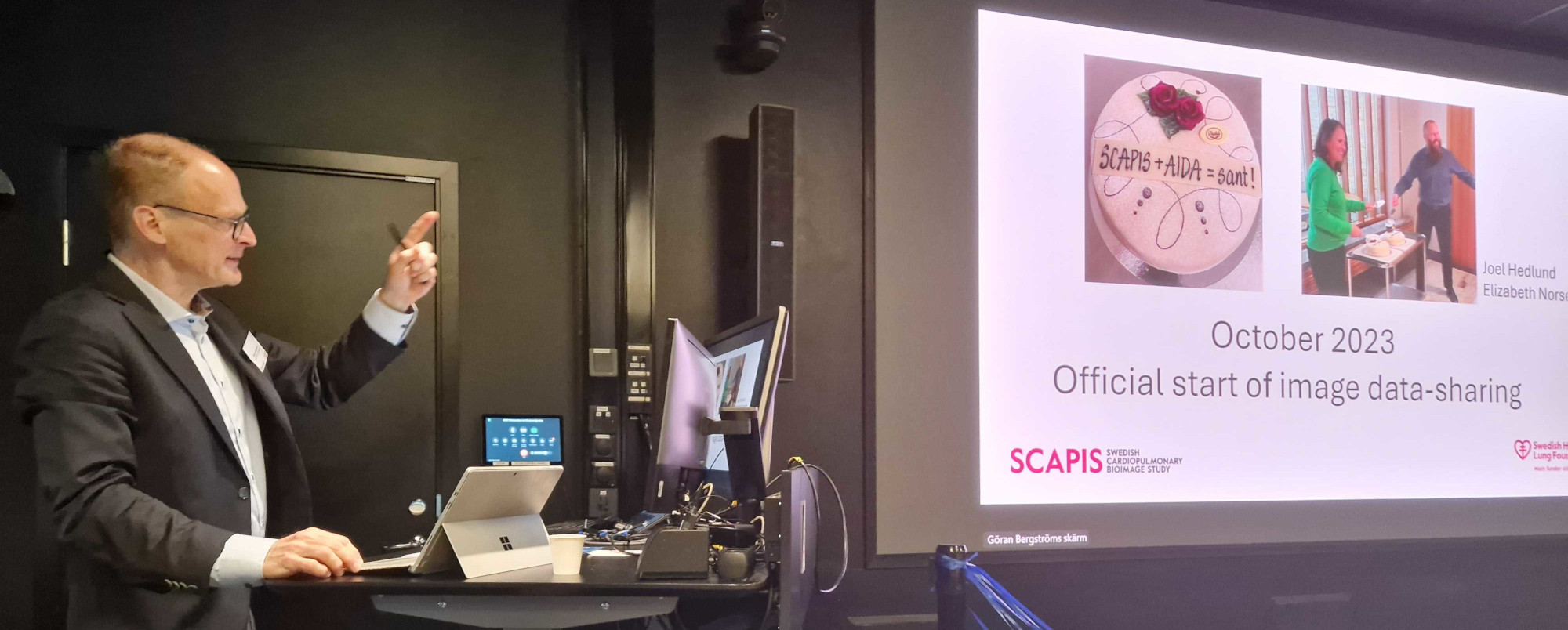 SCAPIS Director Göran Bergström at the DSP Launch, on the history of SCAPIS-AIDA Data Hub collaboration.
SCAPIS Director Göran Bergström at the DSP Launch, on the history of SCAPIS-AIDA Data Hub collaboration.
Among the invited speakers is Göran Bergström, director of the Swedish CArdio-Pulmonary bioImaging Study (SCAPIS), which aims to predict and prevent cardiovascular and pulmonary disease. It is a nationwide, open-access, population-based cohort, where more than 30,000 healthy middle aged individuals across Sweden have been given very deep and thorough medical examinations, with imaging, genetics, questionnaires, bloodworks, etc, and are now being followed up to study how their health develops over time.
“We are already using AIDA Data Hub for sharing the SCAPIS CT imaging data, to enable very important research for ensuring Sweden’s future public health”, says Göran. “These data are quite large, and with DSP, we hope to make this sharing easier, and that the researchers will be able to run their analyses directly on the platform, without having to download the data.”
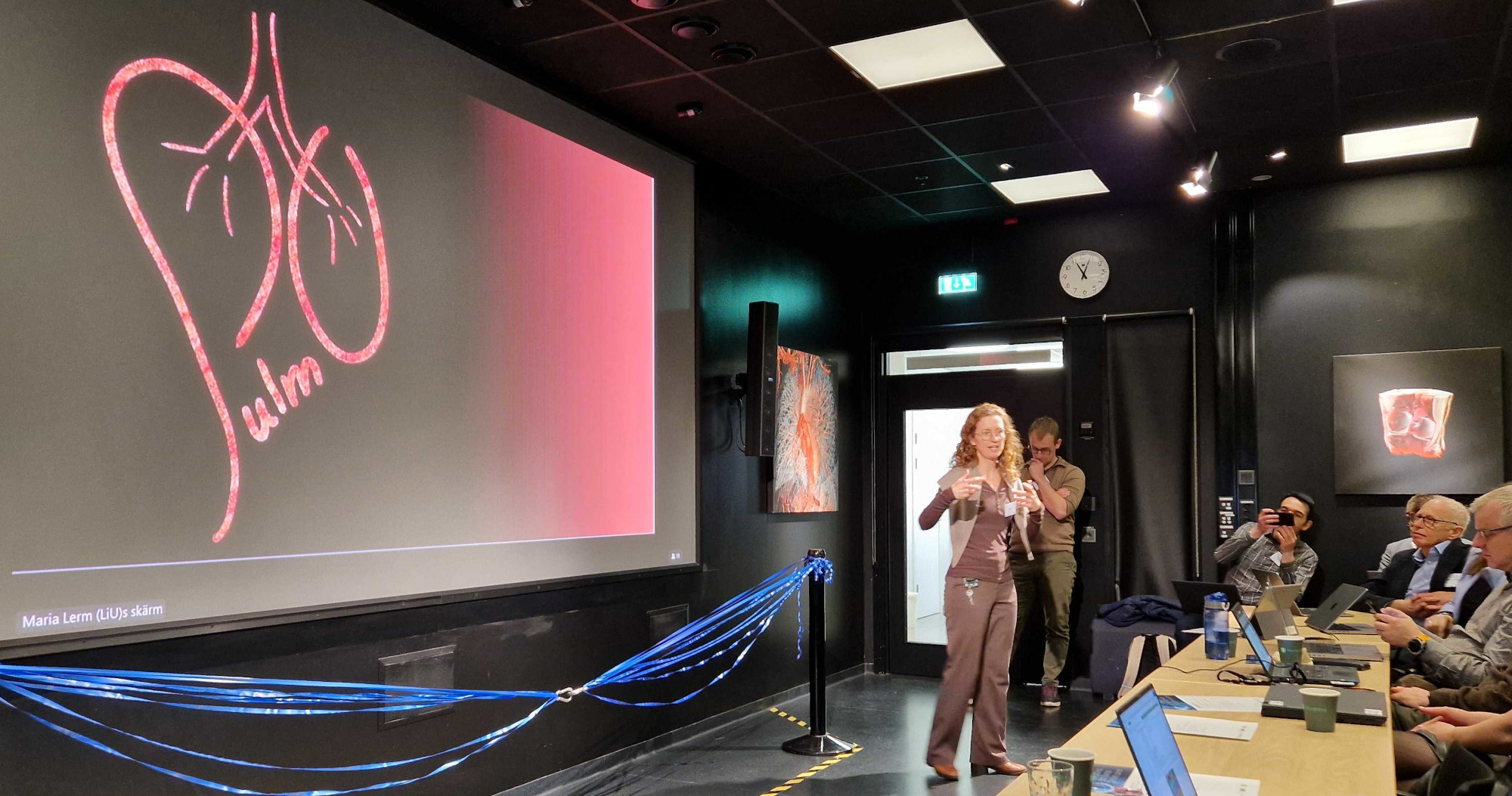 PredictMe CEO Maria Lerm presenting promising indications for epigenetic diagnostics in longcovid.
PredictMe CEO Maria Lerm presenting promising indications for epigenetic diagnostics in longcovid.
The ability to offer secure processing environments on-platform is useful also to the ASHA project, which aims at helping Sweden transition to more effective handling of healthcare data using open standards. The DSP contribution to ASHA will be presented in detail to the Vitalis conference in May, but a main focus is to provide excellent secure collaboration environments to the driver use cases in the project. One of these drivers is the PULMO project for AI innovation in epigenetic diagnostics for longcovid and other lung diseases.
“The goal is that you should be able to do a mouth swab, and have an AI algorithm discern what type of disease you may have, based on DNA methylation patterns that can be specific even for subtypes of disease”, says Maria Lerm, CEO of AI startup company PredictMe that provides the AI algorithms for the study. “Early results show promising indications, also in longcovid. The long term vision is of course that this algorithm should be able to help point your doctor toward treatments that are tailored to you personally, that could help treat the biological causes behind your symptoms, instead of just treating the symptoms.”
Flexible solutions and flagship compute
The DSP has its beginnings in the AIDA DGX-2 service, which is operated in collaboration with Region Östergötland, in the same secure data centers that host the hospital electronic healthcare record production servers. However, the new system is instead hosted in NAISS data centers, where the national flagship compute system Arrhenius and the European AI factory Mimer will be built.
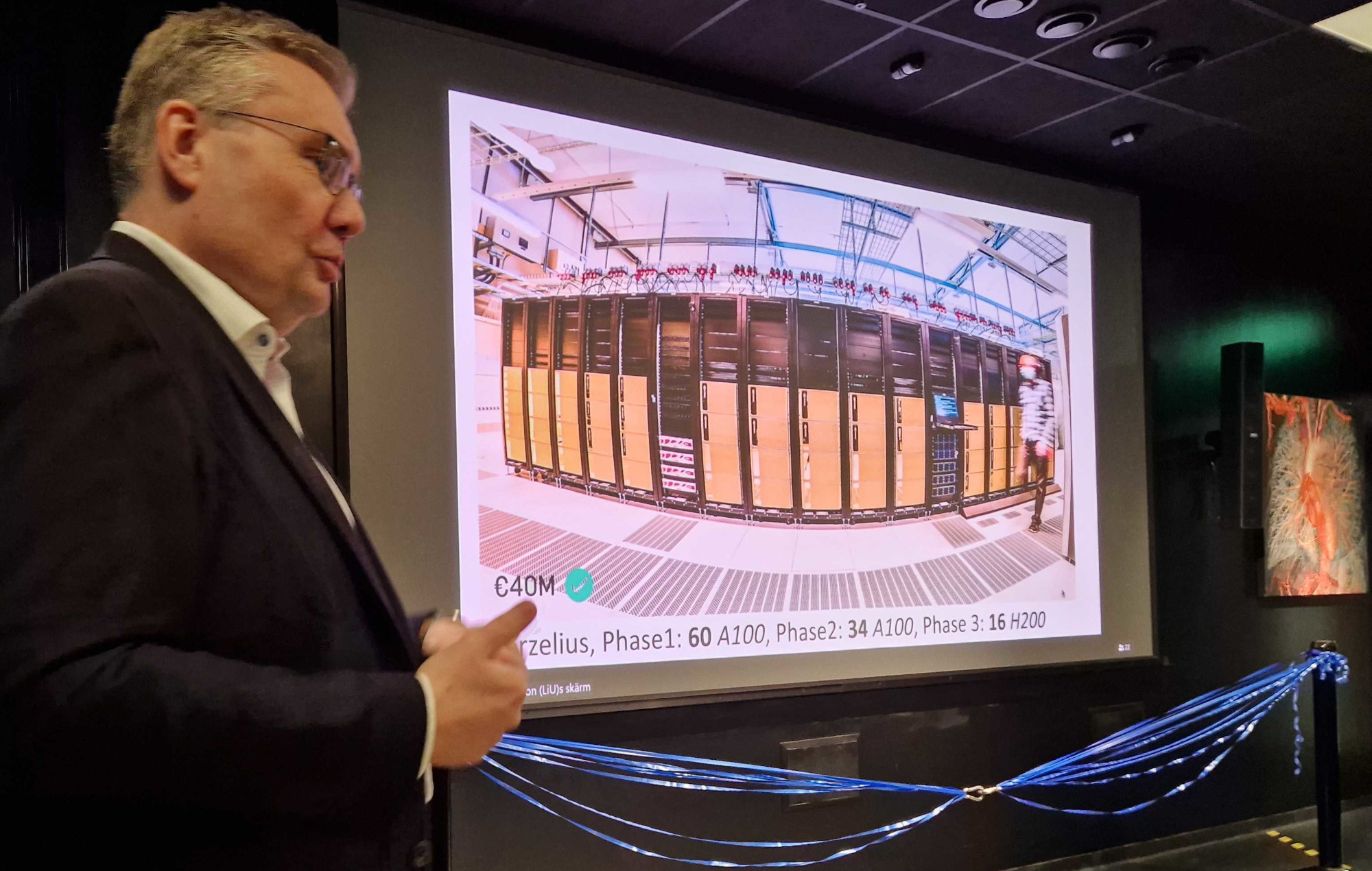 Mimer application signatory Matts Karlsson presenting flagship compute systems at NAISS.
Mimer application signatory Matts Karlsson presenting flagship compute systems at NAISS.
“So when extreme needs for computational power arise, the intention is that the users will be able to leverage the massive power of these flagship systems, together with their data that is safekept long term on DSP, providing the best of both worlds”, Joel goes on.
Many platforms are designed with the security concerns of the operators at the forefront, meaning that the operator takes extensive responsibility for the operations, and puts comprehensive security measures in place to deal with almost any threat. However, a one-size-fits-all approach to security can easily create limitations that make valid and valuable research scenarios impossible to implement using the system. In fact, this mindset runs contrary to how responsibilities are laid out in law, where the user is the data controller, and thus by law is responsible for both their activities and for ensuring that the safeguards are suitable for the activities instead of hindering them. In contrast, the DSP is designed with these legal responsibilities in mind.
“Everything is locked down by default. However, users can decide to open up as appropriate, so that it becomes possible to carry out their legally approved activities, without affecting other users on the platform. That is the guarantee we offer”, clarifies Joel. “Also, we have promised to pitch in when construction of these flagship systems starts, so hopefully some of what we have developed for DSP can be implemented there as well”, he adds.
International inspiration
The typical DSP user is a researcher at a university, in an ethically approved research project. However, in principle the customer could just as well be a company, or a healthcare provider doing structured quality improvement work according to patient data law. This is a novel concept in Sweden, but our neighbors to the east have had access to services from CSC to support a data driven society for decades. CSC, in fact, is a major inspiration for DSP. CSC operates the pan-European pre-exascale supercomputer LUMI, and also provides services to the Ministry of Social Affairs and Health, and to the Ministry of Science and Culture.
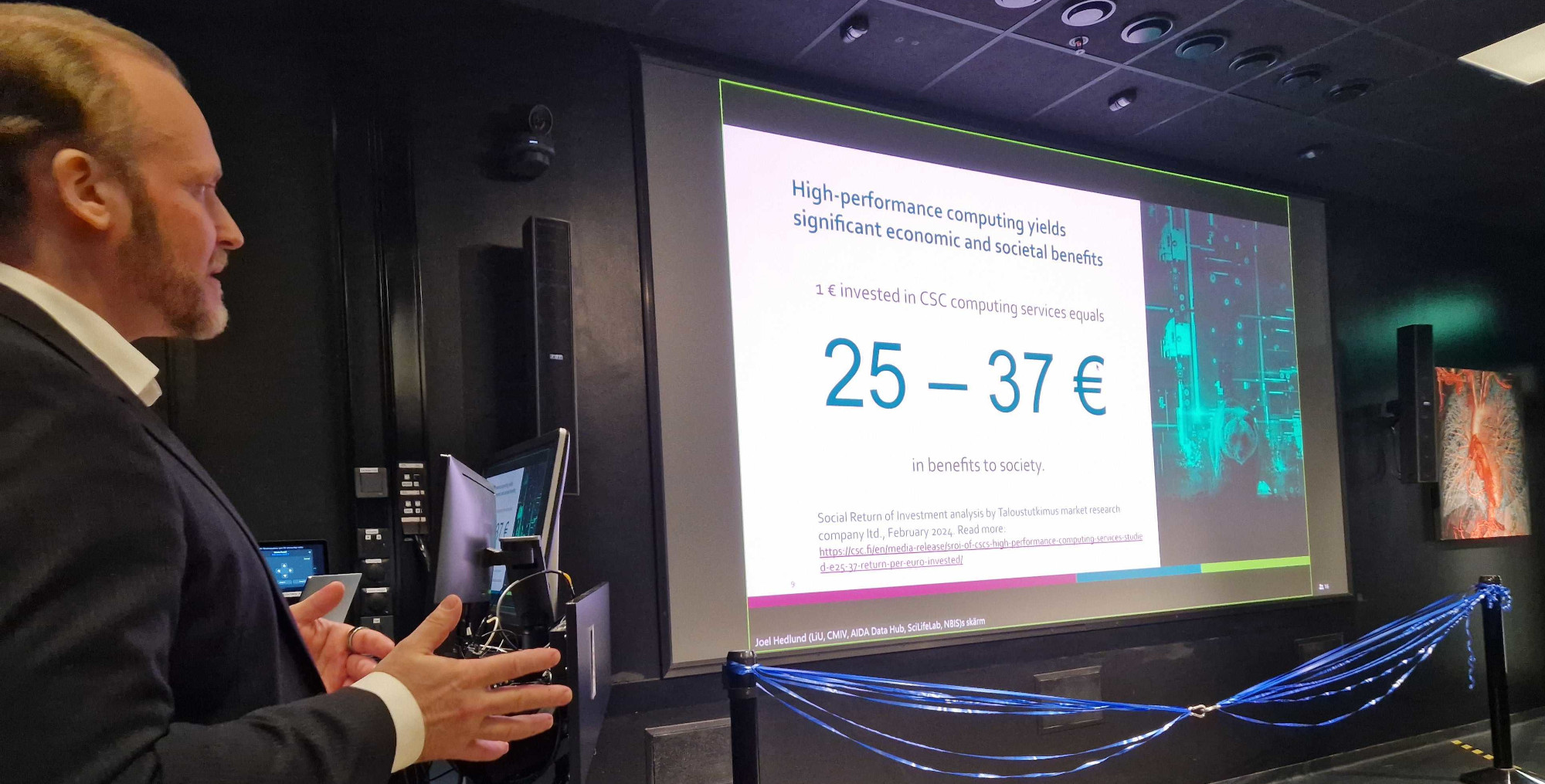 ELIXIR Finland Head-of-Node Tommi Nyrönen presenting societal return of investments in high performance computing infrastructure.
ELIXIR Finland Head-of-Node Tommi Nyrönen presenting societal return of investments in high performance computing infrastructure.
“CSC goes back to 1971, and now employs over six hundred people”, Finnish ELIXIR Head-of-Node Tommi Nyrönen explains. “We are a publicly owned not-for-profit enterprise, tasked with providing research, education and culture ICT services to Finnish society and research. A recent analysis revealed an about thirty-fold societal return of investments into supercomputing infrastructure. This value proposition can be realised for example by bringing ELIXIR life science data available on AI factory platforms, as the recent Nobel-prize winning example of protein structure prediction showed.”
The DSP is also operated based on user fees, and because AIDA Data Hub is part of a public agency, the prices are set so as not to interfere with the free market. However, should these prices lead to higher profits than allowed for a public agency, then discounts will be offered so as to incentivize data sharing and maximizing high impact research.
“As that is the intended output from this system; not profit”, stresses Joel. “And with that said, welcome one and all, for the AIDA Data Hub Data Science Platform is now Open for Business!”
 The inauguratory connection, made by the AIDA Steering group and Data director, that signifies that the DSP is now Open for Business.
The inauguratory connection, made by the AIDA Steering group and Data director, that signifies that the DSP is now Open for Business.